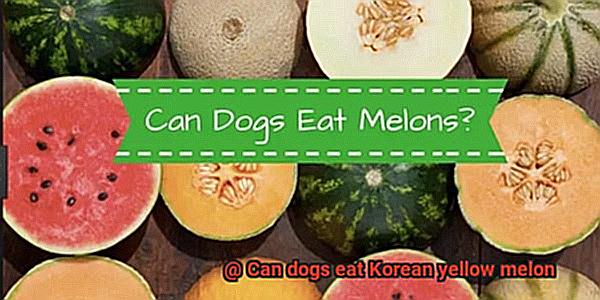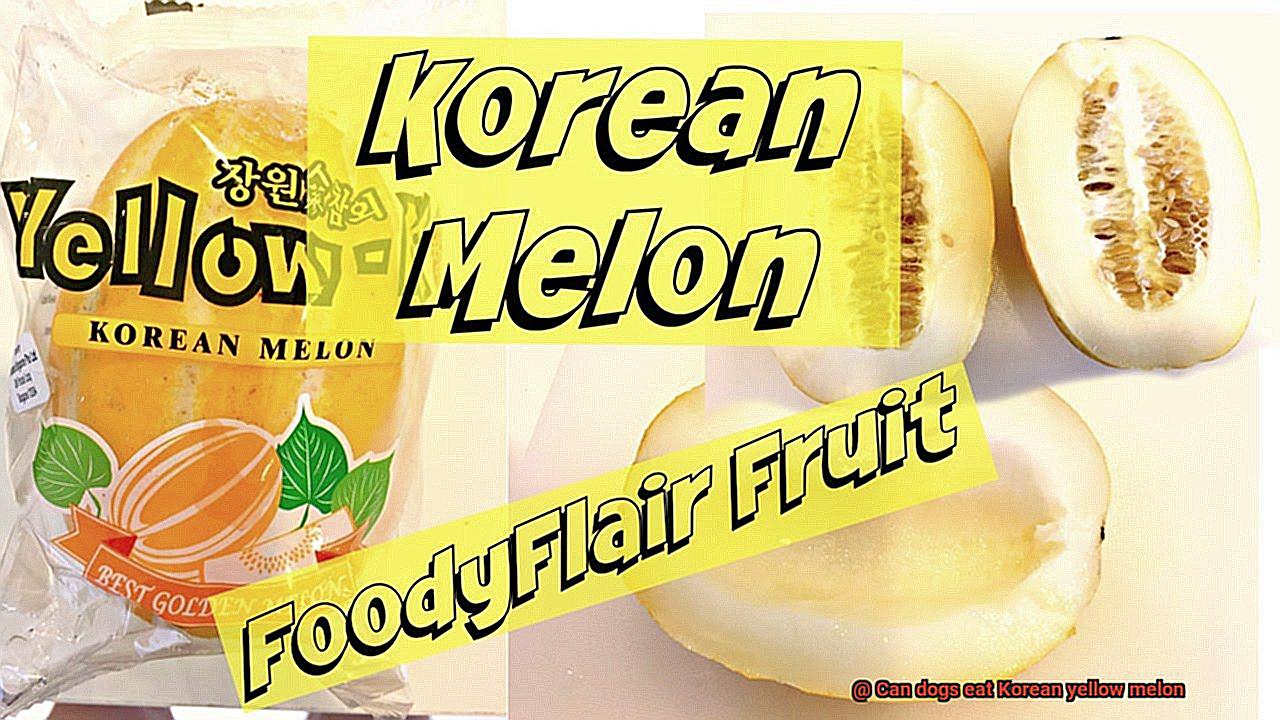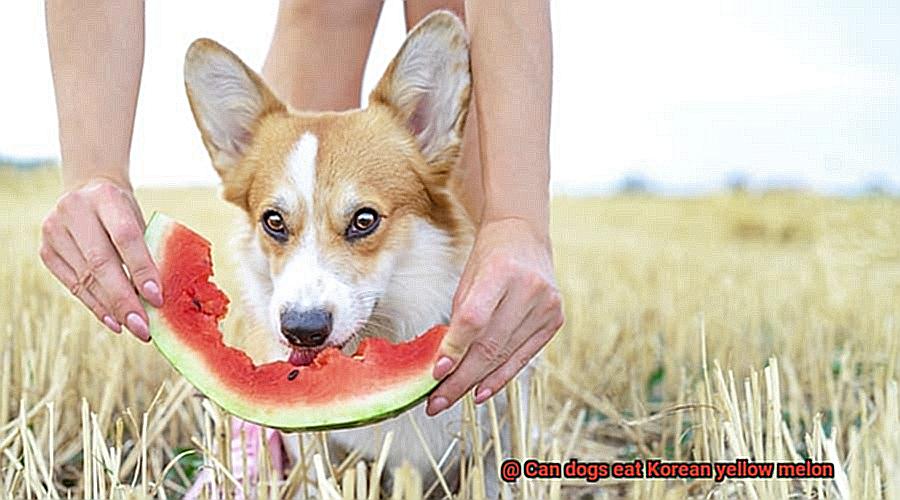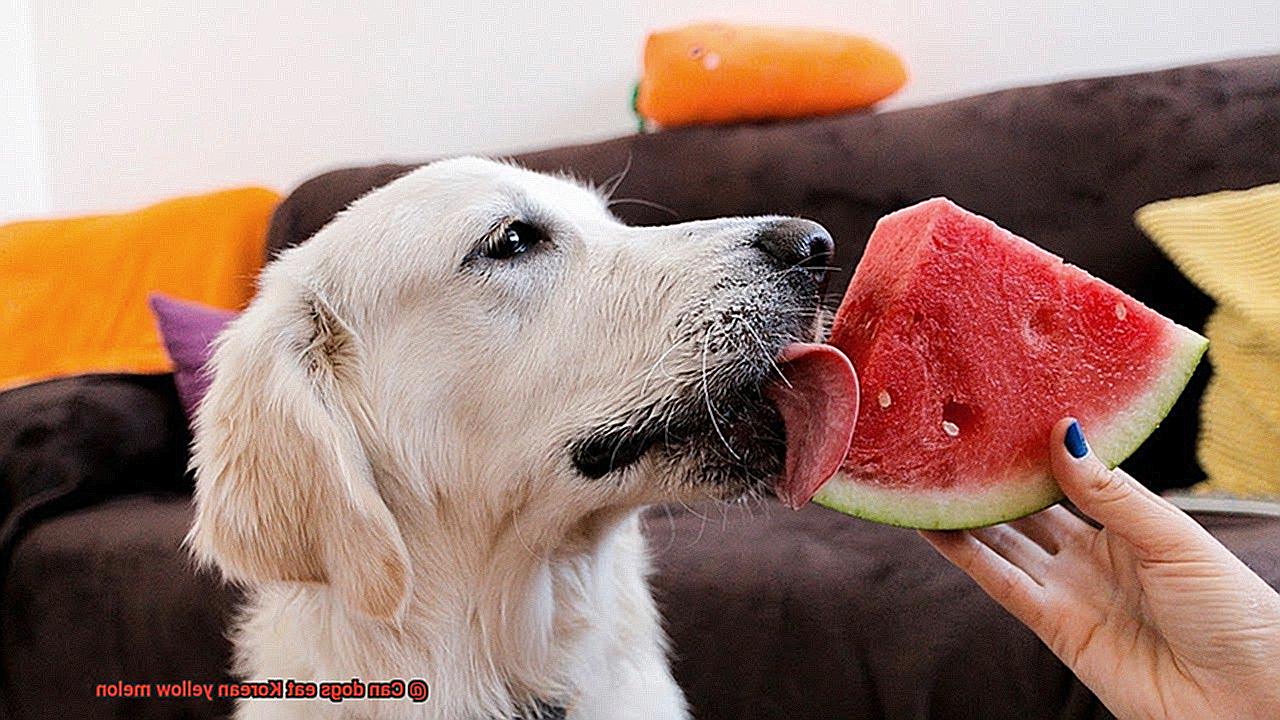Can dogs eat Korean yellow melon?
Ever wondered if our furry pals can join in on the melon madness? Today, we’re diving headfirst into the world of Korean yellow melon to find out if it’s a safe and scrumptious treat for our tail-wagging buddies.
Now, before you start worrying about whether this exotic delight is a good fit for your pup’s palate, fear not. In this blog post, we’ll unravel the mysteries surrounding this vibrant fruit and explore the potential benefits it may bring to your dog’s diet. Get ready for a juicy adventure.
So, gather ’round as we peel back the layers of this sweet and refreshing melon. Together, we’ll uncover whether dogs can safely indulge in its golden goodness. Join us as we embark on a journey through flavor-filled orchards and discover if this tropical treasure is tailor-made for our beloved canine companions.
Are you already drooling at the thought? Hold onto your leashes, dear readers, because we’re about to reveal the tales behind this incredible fruit. Let’s dig deep into the potential health perks hidden within its sunny flesh and determine if it holds the key to satisfying your furry friend’s taste buds. Brace yourselves for some exciting discoveries ahead.
The Nutritional Benefits of Korean Yellow Melon for Dogs
Contents
- 1 The Nutritional Benefits of Korean Yellow Melon for Dogs
- 2 Potential Risks of Feeding Dogs Korean Yellow Melon
- 3 How to Introduce Korean Yellow Melon to Your Dog’s Diet
- 4 Removing the Skin and Seeds Before Feeding
- 5 Signs of Digestive Upset When Eating Korean Yellow Melon
- 6 Consulting with a Veterinarian Before Offering Korean Yellow Melon
- 7 Moderation is Key When Feeding Dogs Korean Yellow Melon
- 8 Alternatives to Korean Yellow Melon for Dogs
- 9 Conclusion
If you’re looking for a healthy and delicious treat to add to your furry friend’s diet, look no further than Korean yellow melon, also known as chamoe or golden melon. This vibrant fruit not only satisfies your dog’s taste buds but also offers numerous nutritional benefits.
In this article, we will explore the advantages of including Korean yellow melon in your French Bulldog’s diet.
Hydration is Key:
As we all know, staying hydrated is essential, especially during hot summer months. Korean yellow melon is made up of approximately 90% water, making it an excellent choice to keep your French Bulldog hydrated. Proper hydration supports overall health and prevents issues like dehydration.
Vitamins for Wellness:
Korean yellow melon is packed with essential vitamins that contribute to your French Bulldog’s well-being. It contains vitamin A, which promotes healthy vision, immune function, and cell growth. Vitamin C acts as an antioxidant and strengthens the immune system. Additionally, this fruit provides vitamin K and various B vitamins.
Mineral Boost:
Minerals are crucial for your French Bulldog’s health, and Korean yellow melon delivers. It contains potassium, which supports heart function and aids in muscle contraction. This fruit also provides small amounts of calcium, magnesium, and phosphorus – important elements for strong bones and teeth.
Fiber for Digestive Health:
Maintaining a healthy digestive system is vital for your French Bulldog’s well-being. Korean yellow melon contains dietary fiber that aids digestion and promotes bowel regularity. It helps prevent constipation and keeps your pup’s tummy happy.
How to Introduce Korean Yellow Melon to Your French Bulldog:
When adding Korean yellow melon to your French Bulldog’s diet, take it slow and steady. Gradually introduce this fruit in small amounts to ensure your furry friend’s digestive system adjusts comfortably. Remember to always remove the seeds and rind before feeding, as they can pose choking hazards or cause digestion issues.
Consult Your Veterinarian:
Before making any dietary changes for your French Bulldog, it’s essential to consult with your veterinarian. They can provide personalized advice based on your dog’s specific needs, health conditions, and dietary restrictions.
In conclusion, Korean yellow melon can be a nutritious and hydrating treat for your French Bulldog. Its high water content, vitamins, minerals, and fiber make it an excellent addition to their balanced diet. Just remember to introduce it gradually, remove the seeds and rind, and consult with your vet if you have any concerns. Bon appétit to your furry friend.

Potential Risks of Feeding Dogs Korean Yellow Melon
Today, we’re diving into the potential risks of feeding your furry friend Korean yellow melon, also known as chamoe. While this delightful fruit is beloved in Korea for its sweet and refreshing taste, it’s important to be aware of the potential risks when sharing it with your four-legged companion. So, let’s dig in and explore the potential hazards together.
Sugar Overload:
Just like humans, dogs have different nutritional needs. Feeding them excessive amounts of sugar can lead to weight gain, obesity, and even diabetes. So, although your Frenchie may drool over the juicy sweetness of Korean yellow melon, it’s crucial to feed it in moderation.
Seed Safety:
While the flesh of Korean yellow melon is safe for dogs, the seeds pose a potential choking hazard or risk of intestinal blockage. Remember to remove all seeds before serving this tasty treat to your Frenchie.
Digestive Sensitivities and Allergies:
Not all dogs have iron stomachs, and some may experience digestive sensitivities or allergies to certain fruits, including Korean yellow melon. To play it safe, introduce this fruit gradually and keep an eye out for any adverse reactions such as vomiting or diarrhea.
Pesticide Perils:
The cultivation process of Korean yellow melon may involve pesticides or other chemicals that can be harmful to dogs if ingested. Wash and clean the fruit thoroughly before offering it to your Frenchie, or consider opting for organic melons to minimize the risk of pesticide exposure.
Moderation Matters:
Remember, moderation is key when it comes to introducing any new food to your dog’s diet. Even if a particular fruit is deemed safe for dogs, overfeeding can still lead to digestive upset or other health issues. Always consult with your veterinarian for personalized advice tailored to your Frenchie’s unique dietary needs.
How to Introduce Korean Yellow Melon to Your Dog’s Diet
Look no further than Korean yellow melon, also known as chamoe or golden melon. This delicious fruit is not only loved by humans but can also be a tasty addition to your furry friend’s mealtime. In this post, we will guide you on how to safely introduce Korean yellow melon to your dog’s diet, ensuring they get all the nutritional benefits without any potential risks.
Consult with Your Veterinarian:
Before making any changes to your dog’s diet, it is essential to consult with your veterinarian. They will provide personalized advice based on your dog’s specific needs and health conditions. They can help determine if Korean yellow melon is suitable for your dog and recommend appropriate portion sizes.
Start Small and Monitor Their Reaction:
Begin by introducing small amounts of Korean yellow melon to your dog’s diet. Cut the fruit into bite-sized pieces and offer it as a treat or mix it with their regular food. Watch closely for any signs of digestive upset, such as diarrhea or vomiting. If your dog shows any discomfort, it may be best to avoid feeding them this fruit.
Remove Seeds and Rind:
To ensure your dog’s safety, always remove the seeds and rind from the Korean yellow melon. The seeds can pose a choking hazard, while the rind may be difficult for dogs to digest. Only feed them the flesh of the fruit in small, safe pieces.
Moderation is Key:
While Korean yellow melon is nutritious, it should not replace your dog’s regular balanced dog food. It should be given as an occasional treat or addition to their diet. Remember that every dog is unique, so what works for one may not work for another. Always prioritize your dog’s health and consult with your veterinarian before making any changes to their diet.
Observe for Allergic Reactions:
As with any new food, it’s important to observe your dog for any allergic reactions. If you notice itching, hives, or difficulty breathing after feeding them Korean yellow melon, discontinue immediately and seek veterinary attention.
Removing the Skin and Seeds Before Feeding
French bulldogs are known for their sensitive stomachs and can be prone to digestive issues. While Korean yellow melon can be a healthy addition to their diet, it is important to remove the skin and seeds before feeding it to them. Let’s dive into why this step is crucial for the well-being of your furry friend.
- Tough Skin: The skin of the Korean yellow melon is tough and can be difficult for dogs, especially French bulldogs, to digest. It may cause stomach upset or even blockages if ingested in large quantities.
- Choking Hazard: French bulldogs have a tendency to swallow things whole, making them more susceptible to choking hazards. The seeds of the melon pose a potential risk, as they can get stuck in their throat or cause blockages in their digestive system.
To prepare Korean yellow melon for your French bulldog, follow these simple steps:
- Wash the melon thoroughly to remove any dirt or pesticides.
- With a sharp knife, carefully peel off the skin, ensuring no traces remain.
- Cut the melon into small, bite-sized pieces that are easy for your French bulldog to chew and swallow.
By removing the skin and seeds, you are reducing the risk of digestive problems and potential choking hazards for your French bulldog.

Remember to introduce new foods gradually into your dog’s diet, starting with small amounts. Monitor their reaction for any signs of an upset stomach or allergic reactions. Moderation is key, as too much fruit consumption can lead to weight gain or digestive upset.
If you have any concerns about feeding Korean yellow melon or any other specific fruit to your French bulldog, consult with your veterinarian for personalized advice based on their individual needs and health condition.
Signs of Digestive Upset When Eating Korean Yellow Melon
As a French bulldog owner, it’s important to be aware of the signs of digestive upset that your furry friend may experience when eating Korean yellow melon. While this sweet and juicy fruit is a popular treat in Korea, dogs have different digestive systems than humans, and some foods that are safe for us may not be safe for them. Keep an eye out for the following signs that could indicate your French bulldog is having difficulty digesting Korean yellow melon:
- Diarrhea: Loose or watery stools after eating Korean yellow melon may be a sign that your French bulldog’s digestive system is struggling to handle the fruit. If you notice any changes in their bathroom habits, it’s important to monitor them closely.
- Vomiting: If your French bulldog vomits after consuming Korean yellow melon, it could be a sign that their stomach is irritated or that they are having trouble digesting the fruit. This can be a cause for concern and should be addressed with your veterinarian.
- Abdominal pain or discomfort: Your French bulldog may exhibit signs of abdominal pain or discomfort after eating Korean yellow melon. This can manifest as whining, restlessness, or sensitivity when their belly is touched. Pay attention to any signs of discomfort and consult with your veterinarian if necessary.
It’s important to note that not all dogs will have the same reactions to Korean yellow melon. Some may be able to tolerate it without any issues, while others may experience digestive upset. It ultimately depends on your individual dog’s tolerance and sensitivity to the fruit.

If you notice any signs of digestive upset after your French bulldog consumes Korean yellow melon, it is recommended to consult with your veterinarian. They can provide guidance on whether or not it is safe for your dog to continue consuming the fruit and may suggest alternative fruits or treats that are safer for them.
Remember to introduce new foods to your French bulldog’s diet gradually and in small quantities. This allows their digestive system to adjust and reduces the risk of digestive upset.
Consulting with a Veterinarian Before Offering Korean Yellow Melon
If you’re considering sharing some Korean yellow melon with your French bulldog, it’s important to consult with a veterinarian first. While this delicious fruit may be safe for dogs in general, it’s crucial to ensure that it suits your French bulldog’s specific dietary needs and health requirements. In this article, we’ll explore why consulting with a veterinarian is essential before offering Korean yellow melon to your beloved furry friend.
Expert Assessment of Dietary Needs:
Veterinarians are trained professionals who understand the unique dietary requirements of dogs, including French bulldogs. By consulting with a veterinarian, you can receive expert guidance on whether Korean yellow melon is suitable for your dog’s individual needs.
Consideration of Individual Factors:
French bulldogs, like any other breed, have distinct characteristics and health conditions that need to be taken into account. Consulting with a veterinarian allows them to assess factors such as your dog’s age, size, overall health, and any existing medical conditions they may have.
Allergies and Sensitivities:
Some dogs may have allergies or sensitivities to certain fruits, including Korean yellow melon. Your veterinarian can help rule out any potential adverse reactions before introducing this fruit to your French bulldog’s diet.
Portion Control and Frequency:
Veterinarians can provide guidance on appropriate portion sizes and frequency of feeding Korean yellow melon to your French bulldog. This ensures that the fruit is incorporated into their diet without disrupting their balanced nutrition.
Preparation and Serving Techniques:
To maximize the nutritional benefits of Korean yellow melon for your French bulldog while minimizing any potential risks, veterinarians can offer advice on how to prepare and serve the fruit correctly.
Gradual Introduction and Monitoring:
If your veterinarian deems it safe for your French bulldog to consume Korean yellow melon, they may recommend gradually introducing it into their diet. This allows for close monitoring of any digestive issues or allergic reactions that may arise.
Regular Check-ups and Adjustments:
Regular check-ups with your veterinarian are crucial for assessing your French bulldog’s overall health and making any necessary adjustments to their diet, including incorporating Korean yellow melon. This ensures that their nutritional needs are consistently met.
Moderation is Key When Feeding Dogs Korean Yellow Melon
Korean yellow melon, also known as chamoe or golden melon, is a popular fruit in Korea known for its sweet and refreshing taste. Many dog owners wonder if this delicious fruit is safe for their furry friends to enjoy. The answer is yes, but it’s important to remember that moderation is key when feeding Korean yellow melon to dogs, especially French bulldogs.
Benefits of Korean Yellow Melon for Dogs:
Feeding your French bulldog small amounts of Korean yellow melon can be a healthy and low-calorie treat option. This fruit is rich in vitamin C, which can boost your dog’s immune system and support overall health. It also contains dietary fiber that aids in digestion, promoting a healthy gut.
Precautions When Feeding Korean Yellow Melon to Dogs:
- Remove seeds and rind: Before giving your French bulldog Korean yellow melon, be sure to remove the seeds and rind. The seeds can pose a choking hazard and may contain trace amounts of cyanide. The rind, on the other hand, is tough and difficult to digest for dogs.
- Introduce gradually: Just like any new food, it’s important to introduce Korean yellow melon to your dog’s diet gradually. Some dogs may have sensitivities or allergies to certain fruits, so it’s essential to monitor their behavior and digestive health after consumption.
- Limit the amount: Too much of any fruit, including Korean yellow melon, can lead to gastrointestinal upset in dogs. It’s recommended to limit the amount of melon given to your French bulldog and ensure it only makes up a small part of their overall balanced diet.
Consult with Your Veterinarian:
If you’re unsure about whether your French bulldog can eat Korean yellow melon or have any concerns about their health, it’s always best to consult with your veterinarian. They can provide personalized advice based on your dog’s specific needs and health condition.
Alternatives to Korean Yellow Melon for Dogs
We all want to spoil our furry friends with tasty treats, but it’s important to make sure we’re giving them foods that are safe and healthy. While Korean yellow melon can be a yummy option, there are alternatives that may be more suitable for your French Bulldog. Let’s dive into some tasty alternatives that will have your Frenchie begging for more.
- Watermelon: This summer favorite is not only refreshing but also packed with vitamins and minerals. It’s a fantastic source of hydration for your French Bulldog due to its high water content. Just remember to remove the seeds and rind before serving, as they can cause digestive issues.
- Cantaloupe: If your Frenchie has a sweet tooth, they’ll love cantaloupe. This juicy fruit is not only safe for dogs to eat but also rich in vitamins A and C, which are great for their overall health. Make sure to remove the seeds and rind before offering it to your pup.
- Honeydew Melon: Want to add a little tanginess to your Frenchie’s treat? Honeydew melon is the way to go. Its sweet and slightly tangy flavor is sure to please their taste buds. Plus, it contains vitamins C and E, which are essential for their immune system and skin health.
- Variety is Key: Don’t limit your options. Apples, bananas, and berries are also safe fruits that you can incorporate into your French Bulldog’s diet. These fruits offer different nutritional benefits and can be given as occasional treats or mixed into their regular food.
Remember, introducing any new food gradually is crucial. Keep an eye out for any adverse reactions or allergies your Frenchie may have. If you’re unsure, it’s always best to consult with your veterinarian before introducing new foods into their diet.
nWykhK4S3vk” >
Conclusion
In conclusion, Korean yellow melon can be a safe and healthy treat for dogs.
This delicious fruit is packed with vitamins and minerals that can support your furry friend’s overall well-being. However, it is important to remember that moderation is key.
Too much of anything, including this tasty melon, can lead to digestive upset or weight gain in dogs. So, while you can certainly share a small amount of Korean yellow melon with your canine companion, make sure to do so in moderation.
Always consult with your veterinarian before introducing any new food into your dog’s diet to ensure it aligns with their specific dietary needs.




